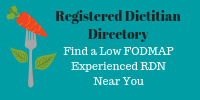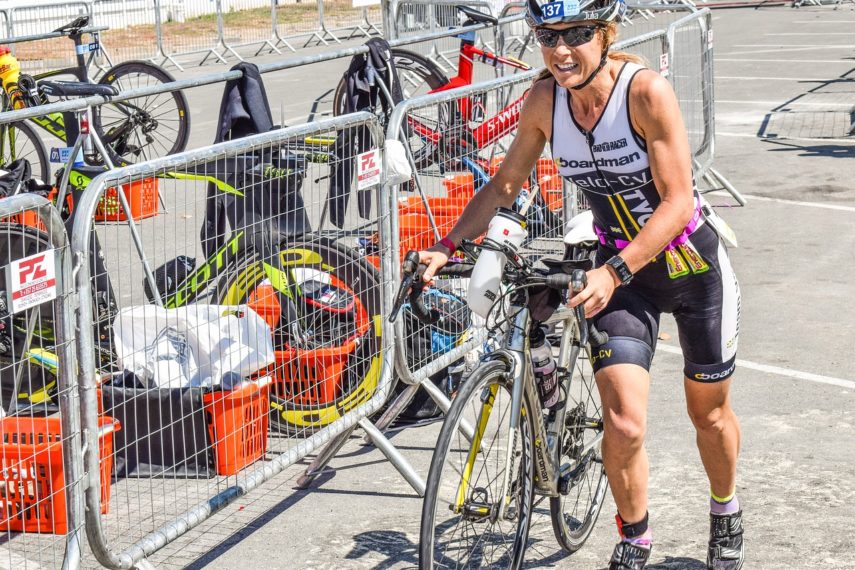Conference Review – FOOD: The Main Course to Digestive Health IBS Highlights
This fall I was fortunate enough to attend FOOD: The Main Course to Digestive Health at the University of Michigan in Ann Arbor. This conference is targeted to dietitians who provide nutrition care for those suffering from gastrointestinal diseases and disorders with current research and clinical applications.

There is a Shortage of RDNs
Unfortunately, there are not enough RDNs specializing in GI nutrition, hopefully conferences such as this will provide the education and confidence for more to consider this specialty. As an IBS sufferer and RDN I have a special interest in GI health since I understand the challenges of living with a functional gut disorder plus understand the power of food in symptom management. For this article I am focusing on only FODMAP and IBS related topics presented.
Here is a copy of the schedule so you see all the amazing speakers and presentations.
Are There Other Treatments Options Aside from the Low FODMAP Diet for IBS?
IBS is a symptom based disorder that can improve with drugs, diet, psychological treatment, stress management, and more. There are a wide range of medications available to treat the dominant symptoms such as constipation and diarrhea including anti-depressants, which can decrease visceral sensitivity, reduce abdominal pain, and alter GI motility. At this time clinicians cannot assess biomarkers to determine who best would respond to the low FODMAP diet, and breath tests are not valuable tools for identifying FODMAP group triggers.

What If the Low FODMAP Diet Does Not Improve Symptoms?
If symptoms persist after following the low FODMAP diet under guidance of a FODMAP trained RDN, one should be evaluated by a medical professional, preferably a GI doctor. Here are a few circumstances that may lead to unfavorable outcomes with the low FODMAP diet alone aside from celiac disease and inflammatory bowel disease – which should have been ruled out before initiating this diet.
- Histamine intolerance– Mucosal damage of the GI tract can decrease the amount of histamine degrading enzymes. In some cases foods high in histamines, such as alcohol, pickled foods, processed meats, leftover reheated meats, tomatoes, citrus, spinach, aged cheese, vinegar and chocolate may provoke some symptoms similar to IBS.
- Mast Cell Activation Syndrome (MCAS)– Mast cells can drive inflammation and allergic process that sometimes result in cardiovascular, respiratory, dermatological, digestive, and neurological symptoms.
- A1 Beta-Casein Intolerance– For those who report poor tolerance to lactose-free milk and yogurt this may be worth looking into. Symptoms are similar to lactose intolerance such as bloating, abdominal pain, and bowel changes. Based on my conversations with the A2 representative some GI RDNs recommend an A2 milk challenge during the low FODMAP Challenge phase to determine if their patient is intolerant to the A1 milk protein or lactose. A2 milk is becoming more available in the United States.
- Sucrose Intolerance– This may be something to consider if both sugar and starch contribute to symptoms. This is a rare disease that may be due to inherited sucrate isomaltase deficiency (SID).
- Bile Acid Diarrhea – This can closely resemble IBS-D.

Can the Low FODMAP Diet Be Applied to Other GI Diseases or Disorders?
Yes, applications of the low FODMAP diet may be prescribed under the guidance of a FODMAP trained RD for gastroparesis, IBD (inflammatory bowel disease), and celiac disease if IBS symptoms are present. IBS is more common in those with IBD versus healthy individuals. Bloating and constipation are common complaints with gastroparesis.
Traditional diet therapies should be exhausted before adding low FODMAP modifications under the care of a qualified healthcare clinician, if appropriate, since further dietary restriction may have a negative impact on health, microbiome, and quality of life. A more cautious challenge approach may help prevent IBD flares and often challenge foods need to be tailored based on the individual.
Is the Strict Low FODMAP Elimination Phase Appropriate for Everyone?
No, not everyone is appropriate for the strict low FODMAP Elimination diet, which is why it is important to work with a FODMAP trained RDN. Often as a RDN I sometimes prescribe the “FODMAP LITE” diet as coined by Patsy Catsos for those who need more broad stroke approaches to their diet versus the strict elimination phase. This often includes greatly reducing apples, wheat, onions, garlic, and milk to keep the FODMAP bucket low or an individualized approach based on typical food patterns.
Quick Reminder: An accurate IBS diagnosis and failure with conventional IBS therapy is often encouraged FIRST. A RDN may not suggest a low FODMAP diet if one’s typical eating patterns are low in high FODMAP foods, for those at risk for disordered eating, or for persons with limited access to food or not willing to change diet.
Any Tips for the Challenge Phase and Coping with Triggers?
There is no evidence-based recommendation when moving through the Challenge phase. One can approach each FODMAP group differently, small cautious challenge to start or a larger portion based on previous history with food. There is no recommended order with the Challenge Phase, however one may opt for higher quality groups first such as Oligosaccharides to help maximize prebiotics especially if there are concerns that the Challenge phase will be a very long process.
Once FODMAP triggers are identified a RDN can help provide tips on how to best cope. Here are some suggestions often used in clinical practice.
- Enteric coated peppermint oil pills to reduce pain, bloating, and help mitigate flares. Examples include Pepogest and IB Guard.
- Glutamine, 5 grams three times a day, may be of benefit in those with post-infectious IBS
- STW 5 (Ibergast) may help with IBS symptoms and dyspepsia
- Psyllium fiber supplements to help modify bowels
- Partially Hydrogenated Guar Gum (PHGG),which appears to more effective in IBS-C
- IBS + Prebiotics– at first the prebiotic may worsen symptoms but over time symptoms were noted less frequently. It would be best to start at a very low dose and titrate up.
- Alpha-galactosidase, which can be found in some digestive enzymes, can be consumed right before consuming oligosaccharides, specifically galactans to improve tolerance.
- Sometimes a probiotic may be recommended by a health professional to help reduce symptoms and/or support healthy gut bacteria.

Why Is It Important to Not Over Restrict?
Unfortunately over restricting is all to common amongst those with GI disorders which can be partly to blame on all the misinformation floating online claiming to cure IBS, SIBO, IBD, or my favorite – leaky gut.
It is important for your dietitian to understand your food fears and anxiety so together you can agree upon a plan that you both are in agreement with.
There is a new diagnosis called Avoidance Restrictive Food Intake Disorder (ARFID) where a person avoids eating or overly restricts diet in hopes of symptom improvement and has a strong belief that avoidance of specific food groups will prevent and treat their GI diagnosis.
There is a higher rate of disordered eating patterns or ARFID amongst those suffering with GI disorders versus the general public.It is encouraged to seek counsel with a mental health professional if food fears and disordered eating are present.
Is there Any Overlap with FODMAP Consumption and GI Distress in Athletes?
GI distress can be described differently based on the individual with symptoms ranging from bloating, abdominal pain, excessive wind, nausea, vomiting, and diarrhea. These GI symptoms can greatly impact athletic performance and are a common complaint amongst endurance athletes especially runners.
During exercise several gut functions are affected including reduced blood flow to the gut, gastric emptying slows, and a temporary increase in intestinal permeability, which can provoke inflammation and alter gut bacteria.
Food, also known as fuel has a significant impact on GI distress. Athletes often rely on sports supplements, which are hypertonic – drag fluid into the colon which can affect digestion. Even healthy individuals (those without IBS) can be sensitive to high fiber, high fat, high carbohydrate (especially high FODMAP) foods consumed around periods of exercise. Athletes are also at increased risk for dehydration and electrolyte imbalances, which can further exacerbate GI symptoms.
Interesting Fact: Cyclists tend to have more upper GI symptoms such as reflux due to postural difference in comparison to runners who have lower GI symptoms.
So what can one do to help minimize these GI symptoms?
- There is no evidence-based approach recommending the consumption of glucose in relation to fructose to mitigate symptoms; trial and error may be the best strategy.
- Short term low FODMAP swaps around exercise may help reduce symptoms of excessive gas, abdominal pain, the urge to defecate, and lessen loose stools and diarrhea.
- Carbohydrate mouth rinses can be used to stimulate brain receptors without moving through the GI tract.
- Consuming a lower fiber diet in the hours before exercise and refuel with plant based fibers and protein for optimal recovery.
- Best to limit foods with added sugars and processed carbohydrates especially around exercise.
Is Behavioral Therapy Important for Those Suffering From Digestive Disorders?
The University of Michigan is lucky enough to have gastro psychologists on their team to help their patients with functional gut disorders (FGD). Chronic digestive disorders are very challenging to treat and a multidisciplinary team can greatly improve outcomes.
IBS can evolve into disabling Centrally Mediated Abdominal Pain Syndrome (CAPS), which causes chronic or recurrent abdominal pain and best treated early. If opiates are combined with IBS there is an increased risk of narcotic bowel syndrome – chronic or recurrent abdominal pain that worsens with narcotics.
Gastro psychology in the form of CBT (Cognitive-behavioral therapy) and gut & esophageal directed hypnotherapy are evidence based treatments for brain – gut disorders and IBD. These therapies can play a role in breaking the GI stress cycle which can often worsen GI symptoms.
A useful tip provided by Dr. Riehl is to try to wait 15 minutes before reacting, during this time the parasympathetic system kicks in which can help break the GI Stress Cycle. Other treatments include muscle relaxation directed to match GI motility, diaphragmatic breathing, open mouth breathing and mindful and meditation apps such as Breathe2Relax, BellyBio, Calm, Headspace, Pacifica, and Mindfullness App.

Anything New in the Treatment of SIBO?
The short answer is no. There are several diets often prescribed for the treatment of SIBO, such as the GAPS diet, SIBO diet, SCD diet, elemental diet, fast tract diet and low FODMAP. Unfortunately, there is not an evidence based diet therapy.
Many of these diets are overly restrictive, expensive, and make dining out and social events extremely challenging. The low FODMAP diet is the preferred diet since many people with SIBO have IBS and this diet can help reduce GI symptoms, however this is not a confirmed treatment option, instead only symptom management.
Reducing FODMAP intake has been shown to reduce histamine, which is involved with immune activation. On the negative side this diet often results in diminished intake of prebiotics and probiotics, which can negatively alter the gut microbiome.
Rifaxamin continues to be the number one recommend treatment option with improved resolution rates with repeated rounds if SIBO reoccurs. Consensus statements suggest breath testing is recommend for the diagnosis of SIBO. There is not a validated gold standard test to assess prevalence of SIBO and there are no FDA approved drugs for the treatment of SIBO.
One analogy Dr. Pimental used was that stagnating water is high in bacteria – think of a pond, while a stream fed river is much lower in bacteria. If GI mobility is diminished, bacteria stagnation can occur. Allowing time for migrating motor complex (MMC) is encouraged for grazers to allow a cleaning wave to help move and digest food. It remains important to try to identify the cause, while the low FODMAP diet may be helpful, antibiotics are often needed to treat.
My take away message with probiotics is that they are discouraged with SIBO. There are conflicting outcomes research studies on the benefits of probiotics and SIBO.
Have any questions or comments? We love to hear from you! Comment below.









